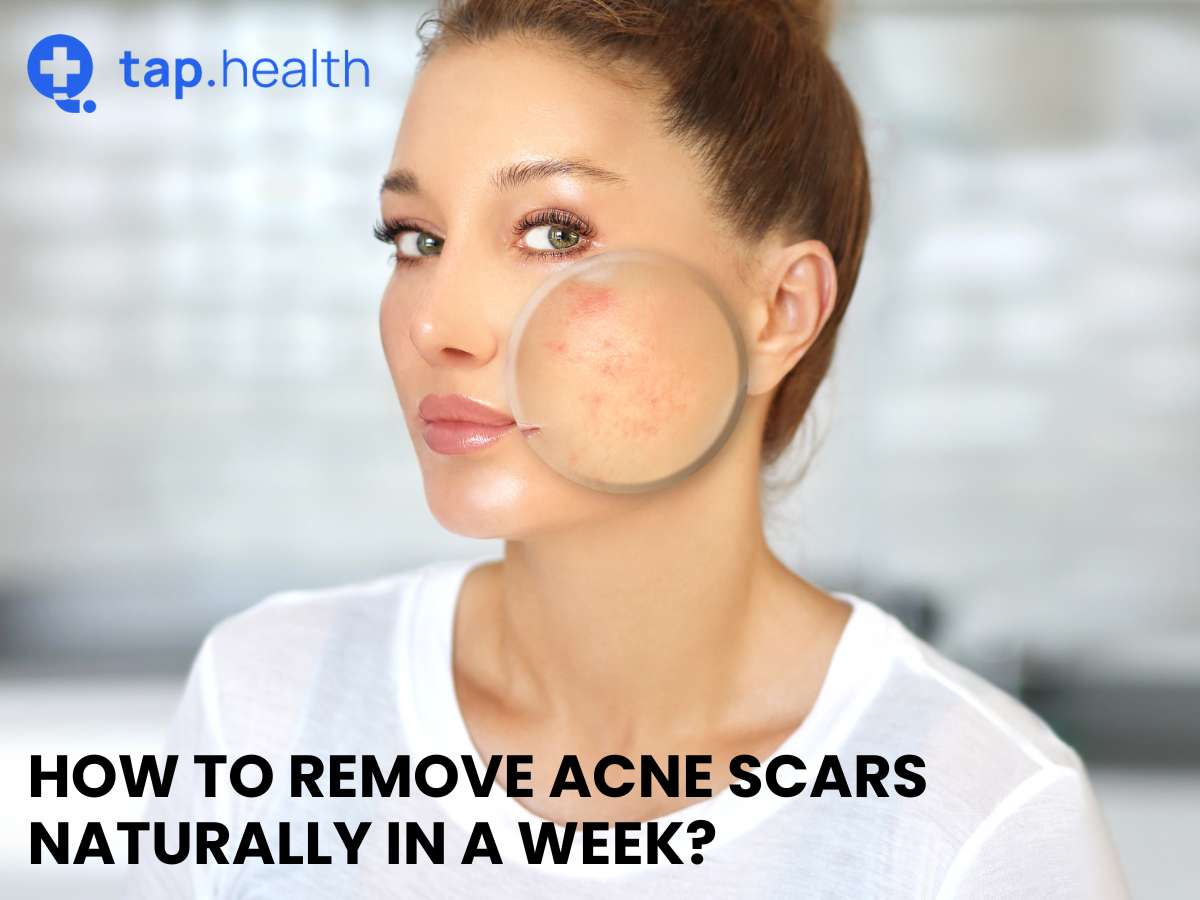Acne scars can be frustrating and impact your confidence. If you’re looking for natural ways to reduce acne scars quickly, this guide is for you. We’ll cover what acne scars are, their causes, types, and provide practical home remedies. We’ll also set realistic expectations for what you can achieve in a week and offer tips for a daily skincare routine, lifestyle changes, and precautions.
What are Acne Scars?
Acne scars are marks left on the skin after pimples or cystic acne heal. They occur when acne penetrates the skin deeply and damages the tissues beneath. As the acne clears, the body tries to repair this damage, but it may not always do so perfectly, leaving behind scars.
Causes of Acne Scars
Several factors contribute to the formation of acne scars:
1. Inflammation:
Severe acne can lead to significant inflammation, damaging the skin and underlying tissue.
2. Delayed Treatment:
Not treating acne promptly can increase the likelihood of scarring.
3. Picking or Squeezing:
Manipulating acne lesions can damage the skin and cause scars.
4. Genetics:
Some people are more prone to scarring due to their genetic makeup.
Types of Acne Scars
Acne scars come in different shapes and sizes. The main types include:
1. Atrophic Scars:
These are indented scars that sit below the surface of the skin. They are further classified into:
- Ice Pick Scars: Deep and narrow.
- Boxcar Scars: Broad with sharp edges.
- Rolling Scars: Wavy and uneven.
2. Hypertrophic Scars
These are raised above the surface of the skin and usually occur on the back and chest.
3. Post-Inflammatory Hyperpigmentation (PIH)
These are dark spots left after the acne heals, more common in people with darker skin tones.
How to Remove Acne Scars Naturally at Home: 10 Effective Home Remedies
Here are ten natural remedies to help reduce acne scars:
1. Aloe Vera
Known for its healing properties, aloe vera can reduce inflammation and promote healing. Apply fresh aloe vera gel directly to the scars and leave it on overnight.
2. Lemon Juice
Lemon juice acts as a natural bleach and can help lighten scars. Apply fresh lemon juice to the scars and rinse off after 10 minutes. Use sunscreen afterward as lemon juice can make your skin more sensitive to sunlight.
3. Honey
Honey has natural antibacterial and healing properties. Apply a thin layer of raw honey to the scars and leave it on for 20 minutes before rinsing.
4. Coconut Oil
Rich in fatty acids, coconut oil can help moisturize and heal the skin. Massage a small amount of coconut oil into the scars daily.
5. Baking Soda
Baking soda acts as a natural exfoliant. Make a paste with baking soda and water, apply it to the scars, and rinse after a few minutes.
6. Apple Cider Vinegar
Known for its astringent properties, apple cider vinegar can help balance the skin’s pH and reduce scars. Dilute it with water and apply with a cotton ball.
7. Turmeric
Turmeric has anti-inflammatory properties. Make a paste with turmeric powder and water, apply to the scars, and rinse after 15 minutes.
8. Rosehip Oil
Rich in vitamins and antioxidants, rosehip oil can help regenerate skin tissue. Apply a few drops to the scars daily.
9. Tea Tree Oil
Known for its antibacterial properties, tea tree oil can help prevent future acne and reduce scarring. Dilute with a carrier oil and apply to the scars.
10. Cucumber
Cucumbers can soothe and hydrate the skin. Apply cucumber juice or slices to the scars and leave on for 20 minutes.
How to Remove Acne Scars Naturally in a Week (Realistic Expectations)
While natural remedies can help improve the appearance of acne scars, it’s important to have realistic expectations. Significant improvement in just one week is unlikely, but consistent use of these remedies can help over time. Be patient and persistent with your skincare routine.
Daily Skincare Routine
- Cleanse: Use a gentle cleanser to remove dirt and oil without stripping your skin.
- Exfoliate: Use a mild exfoliant 2-3 times a week to remove dead skin cells.
- Tone: Apply a toner to balance your skin’s pH.
- Treat: Apply natural remedies or serums targeted at acne scars.
- Moisturize: Use a non-comedogenic moisturizer to keep your skin hydrated.
- Protect: Always use sunscreen to protect your skin from UV damage.
Lifestyle Tips
- Stay Hydrated: Drink plenty of water to keep your skin hydrated and promote healing.
- Eat a Balanced Diet: Consume foods rich in vitamins and antioxidants to support skin health.
- Avoid Picking: Don’t pick or squeeze your acne to prevent further damage.
- Get Enough Sleep: Aim for 7-8 hours of sleep to allow your skin to repair itself.
- Exercise Regularly: Physical activity improves circulation and promotes healthy skin.
Precautions
- Patch Test: Before applying any remedy, do a patch test to check for allergic reactions.
- Sun Protection: Always use sunscreen when using remedies like lemon juice that can increase sun sensitivity.
- Consult a Dermatologist: If you have severe scarring, consider consulting a dermatologist for professional advice and treatments.
FAQ on How to Remove Acne Scars Naturally in a Week
1: Can acne scars be removed completely in a week?
A: It’s unlikely to completely remove acne scars in a week, but natural remedies can help reduce their appearance over time.
2: Are natural remedies safe for all skin types?
A: Most natural remedies are safe, but it’s important to do a patch test first to ensure you don’t have an adverse reaction.
3: How often should I apply these remedies?
A: For best results, apply the remedies daily or as directed, and be consistent with your skincare routine.
4: Can diet affect acne scars?
A: Yes, a healthy diet rich in vitamins and antioxidants can promote skin healing and reduce scarring.
5: What is the best remedy for sensitive skin?
A: Aloe vera and honey are gentle on the skin and are good options for sensitive skin.
By following these tips and incorporating natural remedies into your daily routine, you can help reduce the appearance of acne scars and improve your skin’s health over time. Remember to be patient and consistent, and consult with a dermatologist if you have any concerns.



